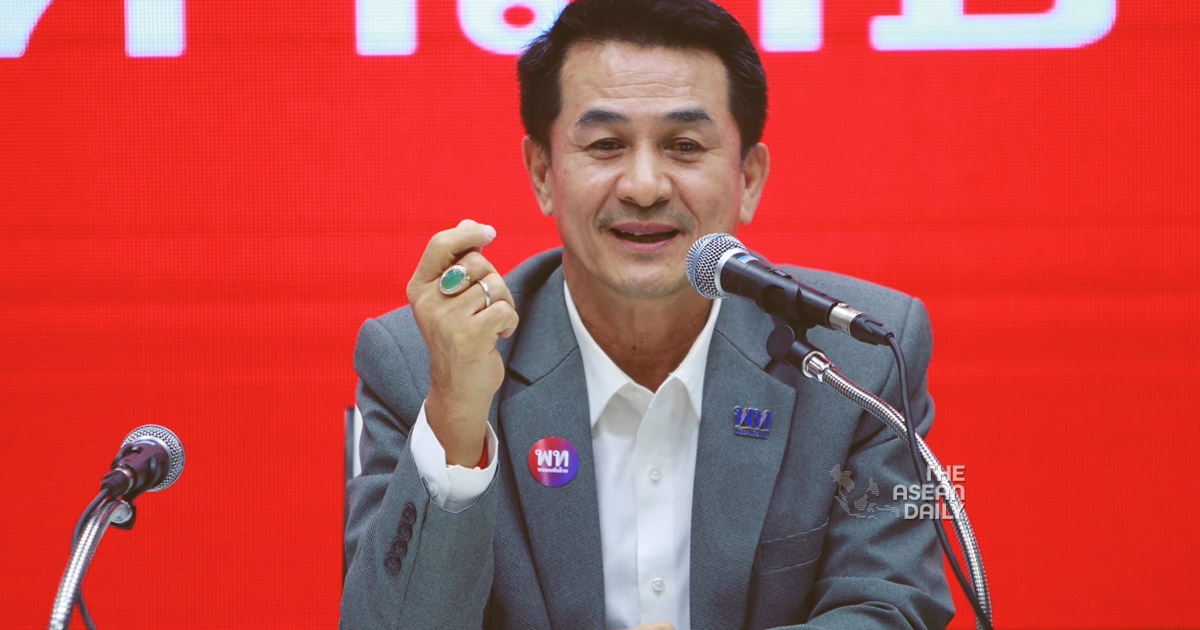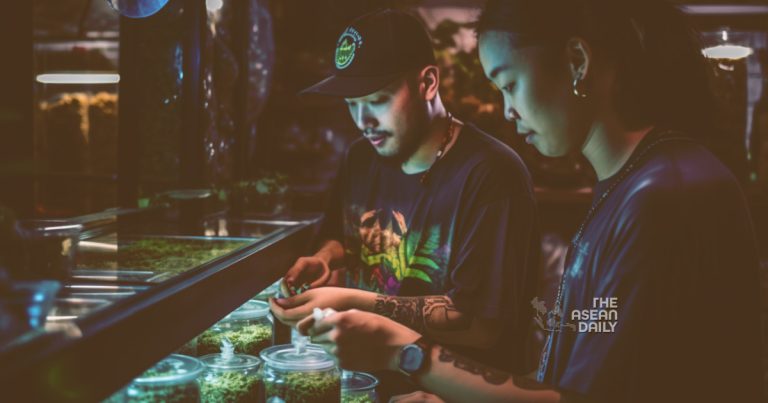10-3-2024 (BANGKOK) In the heart of Bangkok’s iconic Khaosan Road, a once-bustling tourist hub, an underground renaissance is taking place. Beneath the surface, a cool and breezy subterranean plaza formerly housing a supermarket has been transformed into Plantopia, also known as Weed City. This underground enclave, lined with small shops and seating areas, is a hive of activity where cannabis and related paraphernalia are exclusively sold, and customers can indulge in the fragrant smoke on the spot.
For nearly two years, Thailand has witnessed the meteoric rise of the cannabis industry, with an estimated 20,000 registered dispensaries opening since 2022, when the country became the first in Southeast Asia to decriminalize the recreational use of marijuana. However, the days of unfettered and unrestricted cannabis consumption in Thailand could be numbered, as the government grapples with the need to impose stricter regulations on the rampant industry.
At the forefront of this push for tighter controls is Thailand’s health minister, Dr. Cholnan Srikaew, who is spearheading efforts to ban the recreational use of cannabis by the end of the year. According to Dr. Cholnan, changes to the law are currently being negotiated before being presented to the Cabinet this month, with a bill expected to be introduced to parliament before the current session ends in October.

In an interview with Reuters on February 29, Dr. Cholnan suggested that cannabis would only be permitted for medical purposes, and heavy fines would be issued for recreational use or farming without a permit. “Under the new law, cannabis will be a controlled plant, so growing it would require permission. We will support (cannabis cultivation) for the medical and health industry,” he stated.
While some experts support tighter regulations, warning against the blurring of lines between medical and recreational use, business operators fear that the proposed legislation – which is still being hotly contested by different government factions – could cripple small shops and farms, confuse international visitors, and stymie genuine advancements in the medical cannabis field.
Despite the apparent consensus among cannabis operators that regulations are necessary for the industry’s sustainability and viability, there is disagreement over blanket bans on recreational use and “fake restrictions” such as requiring a medical certificate for purchasing the drug.
The draft bill also includes a fine of up to 60,000 baht (US$1,690) for recreational use, while those selling recreational cannabis or participating in the advertisement or marketing of buds, resin, extract, or smoking devices face jail terms of up to a year, a fine of up to 100,000 baht, or both. Farmers cultivating cannabis without a license could face even harsher penalties, including prison sentences ranging from one to three years and fines from 20,000 baht to 300,000 baht.
“It will be a perfect mess,” said Pachara Chayavoraprapa, the chief operations officer of Buddy Group, the operator of Plantopia. “The current regulation is that there’s not really many stringent rules. It’s really loose. The best scenario would be, if possible, to draw new parameters, quite strict ones on cannabis.”
Chayavoraprapa’s vision is to emulate the Amsterdam model, where cannabis use has emerged from the shadows and is supported by cultural events and social spaces, with sales limited to certain zones. “For businesses who have invested a lot to be brought back into the illegal system, I think is a bit unfair,” he said.
Rattapon Sanrak, the founder of Highland Cafe and a leading voice for the cannabis industry for a decade, has witnessed the expansion of business opportunities, a surge in tourism, and a spark of creativity among young entrepreneurs since opening the country’s first dispensary when the drug was decriminalized. As international tourism numbers rebounded to 11.1 million in 2022, up from around 428,000 in 2021, and with 5.2 million visitors already welcomed in 2024 as of February 18, Rattapon is pushing hard for the concept of recreational cannabis use within defined boundaries.

His vision includes strong controls on who can purchase the drug to minimize health impacts, especially for youth, enforced minimum quality standards for cultivation, and bringing cannabis sales within the formal taxation system to generate revenue for the state.
“You need to have a bill which is focusing on managing everything around cannabis. But what the government is trying to do is tightening too much, which will kill a lot of businesses,” Rattapon said, adding that businesses remain frozen in limbo, unable to plan for the future or invest in cultivation, research, staffing, or infrastructure.
“We are all getting stuck in the middle of nowhere. It’s hurting people. It’s not regulated yet, and we don’t have the future bill yet. Anything could happen, so that’s why I cannot see the future or invest in it either. This is going to be a disaster for sure.”
For Professor Paisan Limstit, an outspoken critic of cannabis decriminalization from the Health Laws and Ethics Center at Thammasat University, the uncontrolled sale and consumption of cannabis throughout Thailand must come to an end. He believes that removing the drug from the country’s narcotics list has directly led to the rise of health, crime, and addiction problems, while giving the tourism industry a bad reputation with limited economic returns.
“It’s had rather negative effects on the nation,” Paisan said, estimating that the number of Thai cannabis users has increased tenfold since the law was changed, increasing the risks of other types of drug abuse.
To limit cannabis use and generate more revenue, Paisan advocates for promoting medical pharmaceutical products instead of cannabis tourism, which he believes is the best legislative model.
However, Noah Levit Ades, the director of cannabis operations at Thonburi Healthcare Group, warns against blurring the lines between recreational cannabis consumption and medical use of the drug. His facility’s focus is on cultivating high-end medical cannabis for end-of-life care, cancer, and post-traumatic stress disorder, with strict indoor cultivation processes and scientific oversight.
“The idea of medical cannabis, in my opinion, is a really strong one. But the issue is all those people who claim it’s for medical use and it’s not,” Ades explained. “The dangerous part is having something that you call medical, but that you can grow at your house and put in a bag.”
Ades cautioned that labeling all cannabis use as “medical” could defeat the purpose of genuine medical care and urged the government to consider how destabilizing the industry could allow the black market for recreational marijuana to thrive once more.
Rattapon agreed that such restrictions would simply drive demand back underground. “First of all, if they don’t allow recreational use of it, people are going to use it anyway. And the businesses are going underground for sure,” he said.
The political divisions and interests surrounding the cannabis issue further complicate the matter. Prof. Paisan is unsure if there is political will within the Pheu Thai party-led government to deliver effective controls on the drug, given the inclusion of the Bhumjaithai Party, whose former leader, Anutin Charnvirakul, was instrumental in fostering the industry’s growth.
Paisan has examined two versions of the draft bill currently being considered – a stricter version from the Ministry of Health and a more lenient edition from Bhumjaithai – neither of which clearly addresses the issue of returning cannabis to the narcotics list.
Associate Professor Paul Chambers, a scholar in Southeast Asian politics from Naresuan University, suggests that it may already be too late to enforce any strong law against cannabis, given the industry’s size and potential revenue, projected to be worth up to US$1.2 billion by next year.
“Pheu Thai will likely simply make cannabis a bit harder to access but still accessible enough to continue generating profits for those who can pay a bit more for licenses to produce it, sell it, and (with a doctor’s note) consume it. This is all about paying more money,” Chambers said.
Rattapon believes that cannabis has become a political weapon used by politicians to stir the sentiments of their supporters, leading to divisiveness and stigmatization of the industry.
While most involved in the industry acknowledge the need for change, there is little resistance to the idea of regulation. Ades, coming from California where recreational use is legal for those over 21, said it was “shocking to see how open” Thailand’s weed market had become.
“It was kind of wild to see it,” he said. “But it was one of those things that I knew couldn’t go on forever.”
As Thailand grapples with the complex issue of cannabis regulation, the challenge lies in striking a delicate balance between addressing legitimate concerns, preserving a burgeoning industry, and respecting the will of the people.




